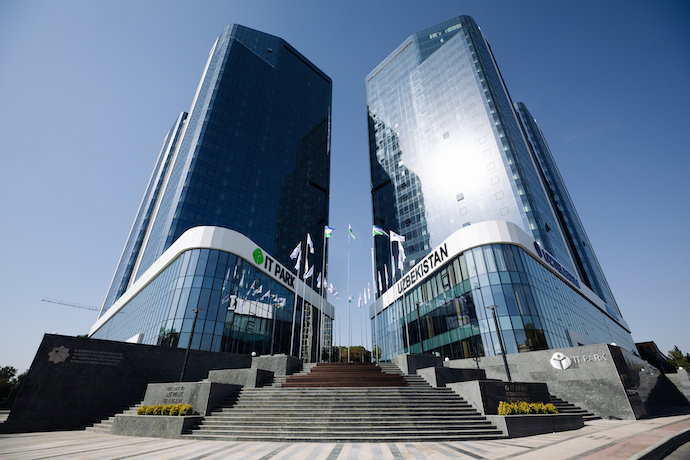
Tech
Uzbekistan’s IT Park: A Catalyst for IT Outsourcing Success
Uzbekistan’s quiet ascent to become a prime locus for IT outsourcing may just be one of the best-kept secrets in the global business landscape. Yet, with the momentum of strategic initiatives and concerted government efforts, this secret is nearing a tipping point toward conspicuous recognition.
IT Park, the epicenter of this transformation, achieved a significant milestone by the end of 2023. The aggregate value of services rendered by the businesses within IT Park soared to an extraordinary $1 billion, complemented by exports of IT services and products reaching $344 million.
Looking to the horizon, Uzbekistan is set with an ambitious target: escalating IT exports to a monumental $5 billion by 2030. Central to realizing this vision is the nation’s endeavor to persuade an international audience of corporations that Uzbekistan is the quintessential hub for their outsourcing ventures.
The groundwork for this international courtship has been methodically laid.
Boasting over 1,800 companies, IT Park has matured into a vibrant crucible of innovation and collaborative ingenuity. Renowned global players — France’s Esokia, Georgia’s Optimo, and the UK’s Itransition, alongside American stalwarts like Exadel, AMCBridge, EPAM Systems, Mightycall, and Dyninno — have strategically selected Uzbekistan as their operational domicile. This collective choice is influenced by Uzbekistan’s geographically strategic position, the abundance of skilled labor, and a nurturing environment for business growth.

As Uzbekistan gazes steadfastly at its goal of amplifying IT service exports to $5 billion by 2030, IT Park is poised to spearhead this ambitious endeavor.
Yet, the narrative of IT Park’s success is not solely defined by quantifiable achievements. It’s the vivid story of the dynamic ecosystem in which it thrives.
Fueling its expansion are proactive government policies dedicated to fortifying the IT infrastructure, rolling out comprehensive workforce development programs, and providing substantial business support. Further fortifying its appeal are the advantageous tax incentives available to IT Park residents. These incentives include sweeping exemptions from corporate and social taxes, a significantly reduced income tax rate, and a VAT exemption on imported goods and services, thereby crafting a propitious climate for IT business proliferation.
In a pivotal move this year, Uzbekistan’s President Shavkat Mirziyoyev has sanctioned the establishment of a specialized domain within IT Park — the Center for Digital Technologies, alternatively known as Enterprise Uzbekistan. This specialized zone promises fertile grounds for digital technology and outsourcing services’ growth, featuring innovative regulations, intellectual property, and personal data protection, government and banking services, tailored labor regulation, as well as support in customs and tax matters, and resolving commercial and civil disputes. With a commencement date set for June 1, the center will embark on a five-year experimental phase, characterized by an avant-garde special legal regime.
Furthering the allure for foreign entities, IT Park has introduced a suite of initiatives: the Zero Risk program, with its comprehensive compensation strategies, complimentary office space, and funding for workforce training; the ONE STOP SHOP for seamless company registration; the IT Visa, ensuring three-year visas for IT professionals, investors, and founders; the Regional Headquarters program, and the virtual office service.
However, Uzbekistan’s ascending narrative in the IT outsourcing realm reflects not only its achievements but also highlights the challenges facing entrenched powerhouses like India and China.
India’s competitive advantage is waning amid rising labor costs and escalating attrition rates, while collaboration is often hindered by cultural and linguistic barriers. China’s outsourcing industry grapples with intricate regulatory environments and intellectual property apprehensions, casting a pall of uncertainty over foreign ventures.
Contrastingly, Uzbekistan offers a tableau of stability and welcoming prospects, supported by a government keen on fostering growth and a burgeoning tech workforce. Annually, around 30,000 graduates emerge from the nation’s 65 tech-focused universities, and over 5 million young English speakers are eager to integrate into international firms. With over 60% of the population youthful, averaging 29 years old, the nation’s workforce is a formidable asset in the competitive global market.
Uzbekistan’s strategic position, competitive labor costs, and dynamic business incentives weave an attractive tapestry for global companies aiming to refine costs and harness exceptional talent.
The country’s rise signifies a tectonic shift in the worldwide outsourcing tableau, bearing witness to Uzbekistan’s determination to forge a distinctive presence in the digital economy.
For corporations intent on optimizing expenses, engaging top-tier talent, and broadening their international reach, Uzbekistan’s IT Park stands as an emblem of innovation and economic vitality, marking the dawn of a pioneering age of ingenuity and prosperity in Central Asia’s heartland.

